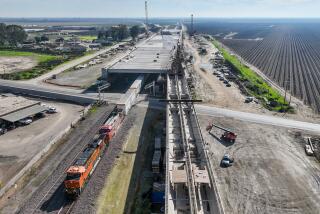U.S. rejects proposed changes to bullet-train project
- Share via
Rejecting the recommendations of a recent state report, federal officials said Wednesday they cannot postpone the deadline to start construction of California’s $43-billion bullet train project or allow the state to move the first leg of the proposed system out of the Central Valley.
U.S. Department of Transportation officials said the 2012 deadline is required by federal legislation that provided about $3.1 billion in funding for the project’s initial leg, which, they added, was placed in the state’s agricultural heartland after considerable study.
“This shows that we are on the same page as the feds,” said Jeffrey Barker, a spokesman for the California High-Speed Rail Authority. “They are saying no to these huge recommendations. This takes them off the table.”
Earlier this month, the California Legislative Analyst’s Office concluded in a detailed critique that the project was poorly managed, faced potential long-term funding problems and had a governing structure in need of sweeping reform.
Until those issues could be addressed, analysts called on the rail authority to push back its federally required construction deadline and consider relocating the initial segment to a major urban area where there was more potential for trains to run sooner.
Analysts further recommended that the Legislature not spend any more money on the project if the federal government did not allow the changes in the route and construction schedule.
Rail officials plan to build the first section of the 500-mile system between Bakersfield and the tiny town of Borden in Madera County. The initial leg, which would pass through Fresno and Corcoran, has been criticized as a “train to nowhere” because high-speed trains would not operate on it until the route could be extended to major population centers.
In a letter to the rail authority, the Transportation Department stated that general appropriations law and the American Recovery and Reinvestment Act require that construction begin in 2012, the last year the funds would be available.
The Transportation Department “has no administrative authority to change this deadline and does not believe it is prudent to assume Congress will change it,” wrote Roy Kienitz, a department undersecretary. “We recommend that policy makers in California proceed on the basis that this deadline will remain fixed.”
Kienitz said the federal government views the Central Valley as a logical place to begin construction of a core line that can be completed quickly and later extended to San Francisco and the Los Angeles Basin. He described the location as a “wise choice” that was made after careful consideration.
After the analyst’s report was released, the state Senate’s Select Committee on High-Speed Rail directed the authority to ask federal officials about changing the funding requirements. Barker said rail officials discussed the issues with Kienitz when he visited Sacramento recently.
State Sen. Alan Lowenthal (D-Long Beach), who chairs the select committee, said the project needs flexibility on the route selection and construction schedule because the projected cost already has risen from $33 billion to $43 billion and there is no long-term funding commitment from the federal government. The legislative analyst contends that the cost could rise as high as $65 billion.
“There is nothing in the letter saying the federal government would commit $17 billion to $19 billion for the project,” Lowenthal said. “If it had, we would build the Central Valley segment right now. But the state needs to be financially and fiscally responsible.”
More to Read
Sign up for Essential California
The most important California stories and recommendations in your inbox every morning.
You may occasionally receive promotional content from the Los Angeles Times.











